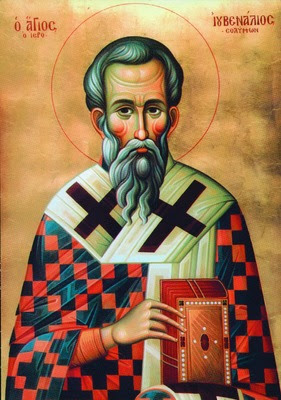 |
| St. Juvenal of Jerusalem (Feast Day - July 2) |
Verses
The memory of Juvenal I celebrate,
Whose divine memory Palestine carries.
Whose divine memory Palestine carries.
Saint Juvenal , Patriarch of Jerusalem, occupied the throne of the Holy City during the years 420-458. During this period great luminaries of the Church enlightened the world: Saints Euthymios the Great (Jan. 20), Symeon the Stylite (Sept. 1), Gerasimos of Jordan (Mar. 4), and many others. In 451, on the see of Jerusalem being recognized as a Patriarchate by the Synod of Chalcedon, he became the first Patriarch of Jerusalem, though Cyril of Alexandria and Pope Leo I opposed the separation of Jerusalem from Caesarea and Antioch.
He was a friend and converser with Saint Euthymios the Great. During Saint Juvenal’s archpastoral service, the Eastern Church was troubled by dangerous false teachings, which he opposed with pastoral zeal, safeguarding the flock of Christ.
The Third Ecumenical Synod was convened in the city of Ephesus in 431. It condemned the heresy of Nestorius, which was opposed to the Orthodox teaching of the divine nature of Jesus Christ. Saint Cyril of Alexandria (June 9) presided at this Synod, and among his colleagues was Patriarch Juvenal.
In 451, the Fourth Ecumenical Synod met in the city of Chalcedon. It condemned the Eutchian [Monophysite] heresy, which taught that the human nature in Christ was totally swallowed up and absorbed by the divine nature. The holy Fathers, among them Saint Juvenal, condemned the heresy of Eutychius and affirmed the Orthodox doctrine of the union of two natures in the Lord Jesus Christ, the divine and the human, without separation and without mixture. The heretics, however, continued to confuse the minds of Christians.
At the head of the heretics stood Theodosius, who had won over to his side the widow of the emperor Theodosius the Younger (+ 450), named Eudokia, who lived at Jerusalem. He demanded that Patriarch Juvenal repudiate the Synod of Chalcedon, that is, that he should renounce the Orthodox dogma of the two natures in Christ.
Saint Juvenal would not agree to embrace falsehood, and bravely confessed the Chalcedon doctrine before the heretics. Theodosius and his adherents then deposed Patriarch Juvenal from the patriarchal throne. The Saint withdrew to Constantinople, to Patriarch Anatolios (July 3) and the emperor Marcian. The heretic Theodosius, under the patronage of Eudokia, occupied the patriarchal throne in Palestine, but only for twenty months. Emperor Marcian, holding Saint Juvenal in high esteem, placed him on the patriarchal throne once more, and so the holy confessor returned to Jerusalem.
The Saint made many efforts to restore Church peace. At the suggestion of Saint Symeon the Stylite, the empress Eudokia repented before Saint Juvenal and returned to communion with the Orthodox. A large part of the Jerusalem flock, who had been led astray by the heretics, followed her. Having defeated the pernicious heresies, and having established oneness of mind and propriety, Patriarch Juvenal died peacefully among his faithful flock in 458, after serving as a bishop for thirty-eight years.
The Tomb of Saint Juvenal is located at the Cave Monastery of Saint Onouphrios in Siloam.








